Department of Family Services Alert:

The Golden Gazette is a free monthly community newsletter that covers a variety of topics and community news concerning older adults and caregivers in Fairfax County.


Linneall Naylor: Discovering Her Ancestors and Sharing Their Stories
For decades people have been exploring their family history through genealogical research, but when mail-in DNA ancestry test kits were introduced over 20 years ago, everything changed. Test results often upended what people thought they knew about themselves and their family history. For Linneall Naylor, getting the results of her DNA test 10 years ago was life-changing, revealing surprising ancestry, previously unknown family connections, and deep roots in Virginia, especially in Fairfax County. Her results put her on a path of research and discovery, igniting a passion to uncover her family history and share the stories of her ancestors. Read more.

Why “Just in Case” Antibiotics Can Do More Harm Than Good
Antibiotics are one of the greatest medical discoveries of our time. They have saved millions of lives and prevented countless complications. But like all medications, antibiotics come with risks. So when people ask, “What’s the harm in taking an antibiotic just to be safe?” The answer is sometimes: quite a lot. Read more.

Time Management When You Finally Have Time
Judy Levenstein recently moved from her home in southern California, where she lived independently, to an assisted living facility in Fairfax County so she could be closer to her daughter. She looked forward to having people cook and clean for her, attending lots of planned activities and social events, and spending time with family. It’s a whole new lifestyle for her and she is enjoying it, but Judy is surprised by how overwhelmed and overscheduled she feels. Read more.

What You Need to Know About Low Vision
Low vision is a condition that makes it hard to see and can affect your daily life in big ways. It is caused by different eye conditions and often has few treatments. Low vision is more common in older adults, so it’s important to know what causes it and how to prevent it. Read more.
(by Gwen Jones, Department of Family Services)
In 2021, the Fairfax County Board of Supervisors initiated the Black/African American Historical Marker Project to help ensure a more comprehensive and inclusive telling of the county’s diverse history. This joint project was supported by the Board of Supervisors, Fairfax County Public Schools, the History Commission, and Neighborhood and Community Services.
Local youth were invited to nominate people and places significant to the African American community for the new markers, which commemorate an event, person or location of historical significance. Over 50 nominations were received and five were selected to be historical markers throughout Fairfax County. Each marker is an opportunity to shine a spotlight on these important stories – many of which had never been heard before.
Lillian Blackwell
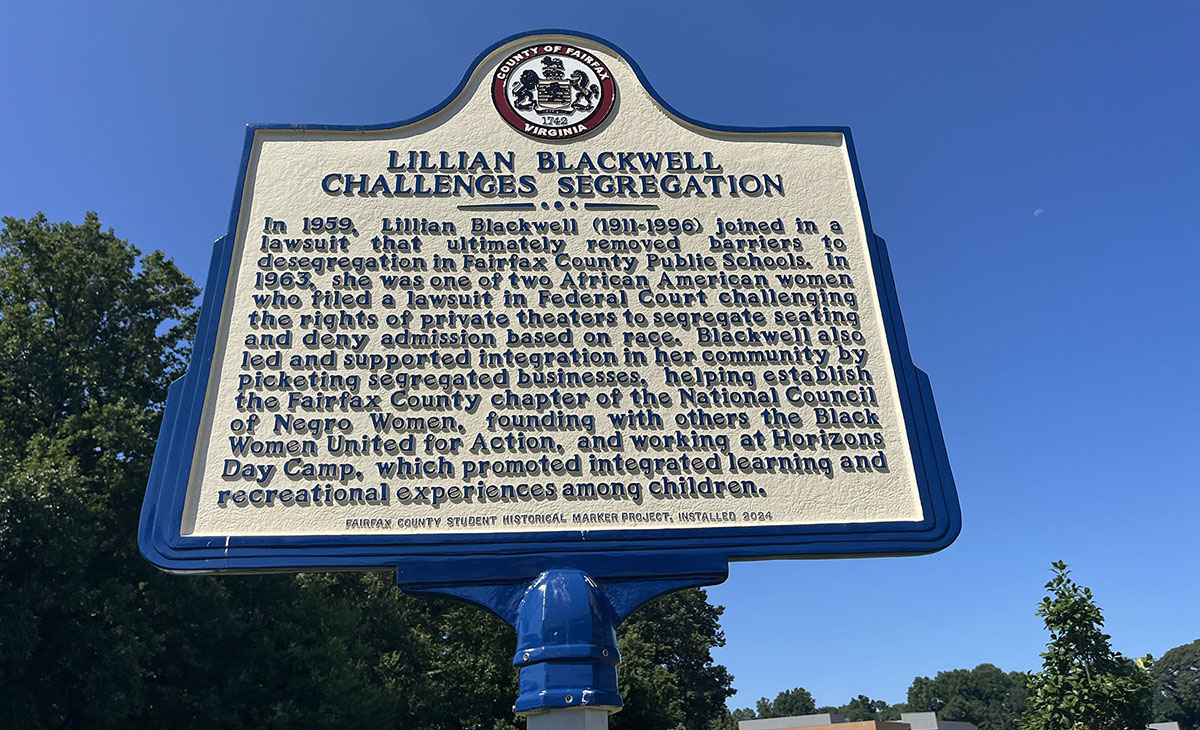
The first marker, dedicated to civil rights activist Lillian Blackwell, was unveiled at Oakton High School on June 1, 2024. The marker text reads as follows:
Lillian Blackwell Challenges Segregation
In 1959, Lillian Blackwell (1911-1996) joined in a lawsuit that ultimately removed barriers to desegregation in Fairfax County Public Schools. In 1963, she was one of two African American women who filed a lawsuit in Federal Court challenging the rights of private theaters to segregate seating and deny admission based on race. Blackwell also led and supported integration in her community by picketing segregated businesses, helping establish the Fairfax County chapter of the National Council of Negro Women, founding with others the Black Women United for Action, and working at Horizons Day Camp, which promoted integrated learning and recreational experiences among children.
Visit this marker at Oakton High School, 2900 Sutton Road, Oakton, VA 22181.
Gunnell’s Chapel
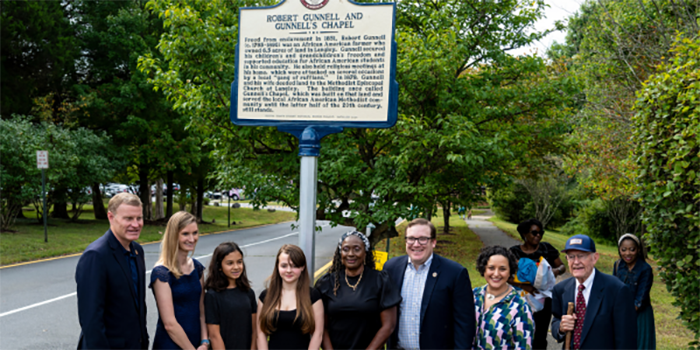
On Sept. 21, 2024, the second marker was unveiled for Robert Gunnell and Gunnell’s Chapel. Located at Clemyjontri Park, the marker is just steps from the historic chapel. The marker text reads as follows:
Robert Gunnell and Gunnell’s Chapel
Freed from enslavement in 1851, Robert Gunnell (c.1795-1890) was an African American farmer who owned 6.5 acres of land in Langley. Gunnell secured his children’s and grandchildren’s freedom and supported education for African American students in his community. He also held religious meetings at his home, which were attacked on several occasions by a local “gang of ruffians.” In 1879, Gunnell and his wife deeded land to the Methodist Episcopal Church at Langley. The building once called Gunnell’s Chapel, which was built on that land and served the local African American Methodist community until the latter half of the 20th century, still stands.
Visit this marker at Clemyjontri Park, 6317 Georgetown Pike, McLean, VA, 22101.
The Enslaved “16”
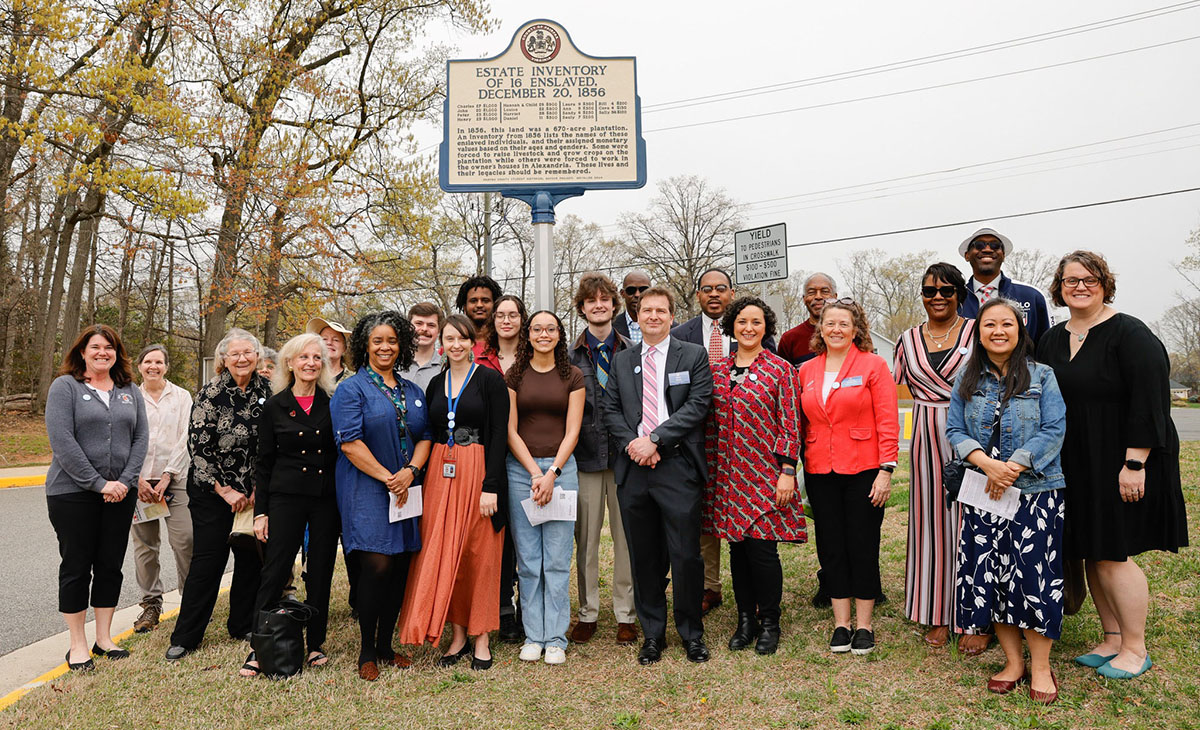
The third marker was unveiled at West Springfield High School on April 5, 2025. The marker recognizes the lives of 16 individuals enslaved by the owner of the land on which West Springfield High School now stands. The marker text reads as follows:
Estate Inventory of 16 Enslaved December 20, 1856
| Charles | 27 | $1,000 | |
| John | 20 | $1,000 | |
| Peter | 25 | $1,000 | |
| Henry | 25 | $1,000 | |
| Hannah & Child | 29 | $900 | |
| Louisa | 22 | $800 | |
| Harriet | 28 | $800 | |
| Daniel | 11 | $500 | |
| Laura | 9 | $300 | |
| Ann | 9 | $300 | |
| Sandy | 6 | $250 | |
| Sealy | 7 | $200 | |
| Bill | 4 | $200 | |
| Cora | 4 | $200 | |
| Sally | 56 | $100 |
In 1856, this land was a 670-acre plantation. An inventory from 1856 lists the names of these enslaved individuals, and their assigned monetary values based on their ages and genders. Some were forced to raise livestock and grow crops on the plantation while others were forced to work in the owner's houses in Alexandria. These lives and their legacies should be remembered.
Visit this marker at West Springfield High School, 6100 Rolling Rd, West Springfield, VA 22152.
General Colin Powell
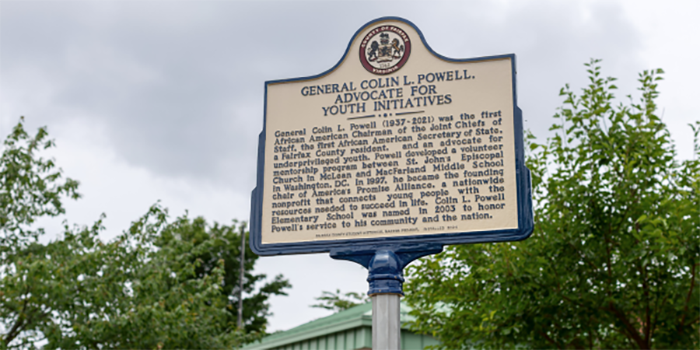
On June 14, 2025, the fourth marker was unveiled at Colin Powell Elementary School to honor General Colin L. Powell. The marker text reads as follows:
Colin L. Powell, Advocate for Youth Initiatives
General Colin L. Powell (1937-2021) was the first African American Chairman of the Joint Chiefs of Staff, the first African American Secretary of State, a Fairfax County resident, and an advocate for underprivileged youth. Powell developed a volunteer mentorship program between St. John’s Episcopal Church in McLean and MacFarland Middle School in Washington, DC. In 1997, he became the founding chair of America’s Promise Alliance, a nationwide nonprofit that connects young people with the resources needed to succeed in life. Colin L. Powell Elementary School was named in 2003 to honor Powell’s service to his community and the nation.
Visit this marker at Colin Powell Elementary School, 13340 Leland Rd, Centreville, VA 20120.
Louise Archer
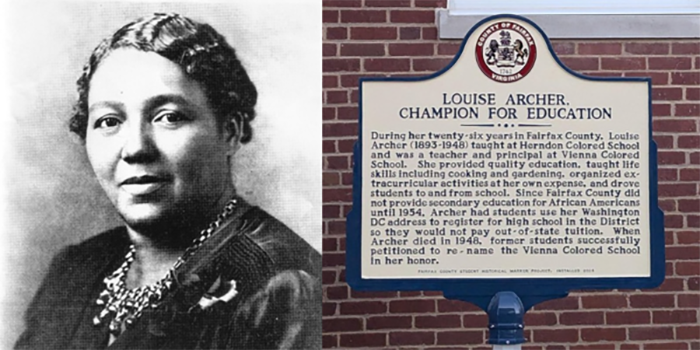
The fifth and final marker was unveiled on Sept. 6, 2025 at Louise Archer Elementary School in honor of Louise Archer. The marker text reads as follows:
Louise Archer, Champion for Education
During her twenty-six years in Fairfax County, Louise Archer (1893-1948) taught at Herndon Colored School and was teacher and principal at Vienna Colored School. She provided quality education, taught life skills including cooking and gardening, organized extracurricular activities at her own expense, and drove students to and from school. Since Fairfax County did not provide secondary education for African Americans until 1954, Archer had students use her Washington DC address to register for high school in the District so they would not pay out-of-state tuition. When Archer died in 1948, former students successfully petitioned to re-name the Vienna Colored School in her honor.
Visit this marker at Louise Archer Elementary School, 324 Nutley St NW, Vienna, VA 22180.
To learn more about how Fairfax County is working to preserve and celebrate African American history and explore available resources, visit FairfaxCounty.gov/topics/black-african-american-experience.
(by Katherine Hall, Fairfax Area Agency on Aging)

February is recognized as American Heart Month, a time to raise awareness about heart disease and a reminder for family caregivers to focus on their own cardiovascular health alongside their caregiving roles. Family caregiving is often driven by great love, but it can lead to an accumulation of stress over time which can affect one’s personal health. According to recent national research, approximately two-thirds of caregivers mention moderate or high emotional stress, and many report experiencing physical strain and isolation. Caring for an older adult and other family members may complicate the process of planning and maintaining personal health.
Making minor modifications can assist in protecting a caregiver's heart health. For example, light exercise can improve mood and sleep quality, discussions with a friend and/or a support group can help one to deal with apprehension and stress, and regular checkups and support from medical professionals can assist in maintaining physical and emotional health. If you wish to learn more about caregiving resources, call our Aging, Disability, and Caregiver Resource Line at 703-324-7948 or visit FairfaxCounty.gov/OlderAdults.
Family Caregiver Learning Opportunities Hosted by the Fairfax Area Agency on Aging
Virtual Dementia Friendly Information Session
Wednesday, Feb. 11, Noon-1:15 p.m.
Join this virtual presentation and learn how to become a dementia friend. Turn your new understanding of dementia into practical action that can help someone living in your community. Presented by Allegra Joffe, Supervisor with Fairfax Area Agency on Aging, and Diane Watson, Dementia Friends Champion Volunteer. Register online at bit.ly/DementiaFriendlyFairfax or call 571-407-6961.
Fairfax Caregiver Alert Notifications!
If we can’t reach you, we can’t alert you. Now, family caregivers can receive email or text notifications from Fairfax County caregiver services and programs. These programs include case management, in-home respite, caregiver support and webinars, wellness workshops, and much more. Visit FairfaxCounty.gov/alerts to create or sign into your Fairfax Alerts account and then select Area Agency on Aging/Caregivers.
Fairfax Caregiver YouTube Playlist
View Caregiver Webinar videos produced by the Fairfax Area Agency on Aging on YouTube. Choose different topics, interests, and workshops to view on demand. View videos at bit.ly/PlayListCaregiverWebinars or call 571-407-6961.
Get the latest information about programs and services from DFS Adult and Aging by subscribing to our digital newsletters.
Access Fairfax Newsletter
Get news and events for people with disabilities. Sign up at bit.ly/DFS-Access-Fairfax
Caregiver Newsletter
Information about webinars, workshops, support calls, events, and other helpful resources for family caregivers. Sign up at bit.ly/DFS-OA-Caregiver
Golden Gazette Newsletter
Free community newsletter that covers a variety of topics and community news concerning older adults and caregivers in Fairfax County. Sign up at bit.ly/GoldenGazetteSignUp
The Update Newsletter
News that covers helpful topics related to Northern Virginia Long-Term Care Ombudsman. Sign up at bit.ly/DFS-OA-Update
(by Kristin Martin, ElderLink)

ElderLink Virtual Support Call for Family Caregivers of Older Adults, via Microsoft Teams
Tuesday, Feb. 10, 7-8 p.m.
Topic: Changing Relationships – The Shift from Loved One to Caregiver. Are you balancing the roles of both a loved one and a caregiver? Whether you're a spouse caring for your partner, a child supporting a parent, or a sibling looking after a sibling, stepping into the role of caregiver can deeply impact your relationship. Join us to share, learn, and openly discuss ways to navigate your dual roles as a loved one and a caregiver. Register at tinyurl.com/CaregiverTSG or call the ElderLink Intake Line, 703-324-5374.
Exploring the Dimensions of Aging, via Microsoft Teams
Join Inova ElderLink and the Fairfax Area Agency on Aging for online training to help family and professional caregivers. Using a training platform called Embodied Labs, you will see what it’s like to be an older adult facing real-life challenges. This unique experience will promote empathy and help you better understand and support older adults and caregivers. After the training, you will receive a license to use the Embodied Labs platform whenever you want, so you can keep learning. Register at tinyurl.com/exploring-aging.
Caring for You, Caring for Me
Wednesdays, Feb. 4- March 4, 10 a.m.-Noon
Held in-person at Insight Memory Care Center, 3953 Pender Drive #100, Fairfax
CFYCFM is a blend of interactive support and education for caregivers of older adults. This program focuses on advocacy and care for both the caregiver and care recipient. Participants report increased feelings of confidence and competence in their caregiving role after attending this program. Respite services may be available on a sliding fee scale for caregivers who would like to attend but are unable to make arrangements for their loved one. Fairfax County residency required and three weeks advanced notice if respite services are being requested. Contact Holly Giovengo at 703-324-7642, TTY 711, or register at tinyurl.com/CFYCFM4U.
A Matter of Balance
Fridays, March 6-April 24, 10 a.m.-Noon
2740 Prosperity Avenue, Fairfax
Many older adults experience concerns about falling and restrict their activities. This award-winning, eight-week evidence-based workshop is designed to reduce the fear of falling and increase activity levels among older adults. Participants learn fall prevention strategies through discussion and activities, as well as gentle exercise to strengthen balance, flexibility, and coordination. For more information, call Kathy Akindemowo at 703-324-9814, TTY 711. Register at tinyurl.com/AMOB123.
(by Crystal Goodwin, Department of Emergency Management and Security)
February is a month full of spreading love to your family, friends, and community – and one of the best ways of spreading that love is making sure everyone is prepared for emergencies. Help get your loved ones thinking about emergency preparedness this Valentine’s Day with a unique gift. You can get your valentine started on their emergency kit by putting together a starter bag with one or all the following items:
Emergency kits include basic supplies and are tailored to every person’s needs. You will need additional supplies if your household has children, seniors, individuals with access and functional needs, or pets. Kits should be kept in a water-resistant container or a sturdy, transportable bag, and stored in a location where they will be both useful and accessible when needed.
Fairfax County recommends every household keeps three to five days' worth of food, water, and supplies in their shelter-in-place kits for each member of the household. For additional information and a complete checklist of items to include in your emergency kit, visit: FairfaxCounty.gov/emergencymanagement/cerg.
(by Tanya Erway, Volunteer Solutions Recruitment Coordinator)
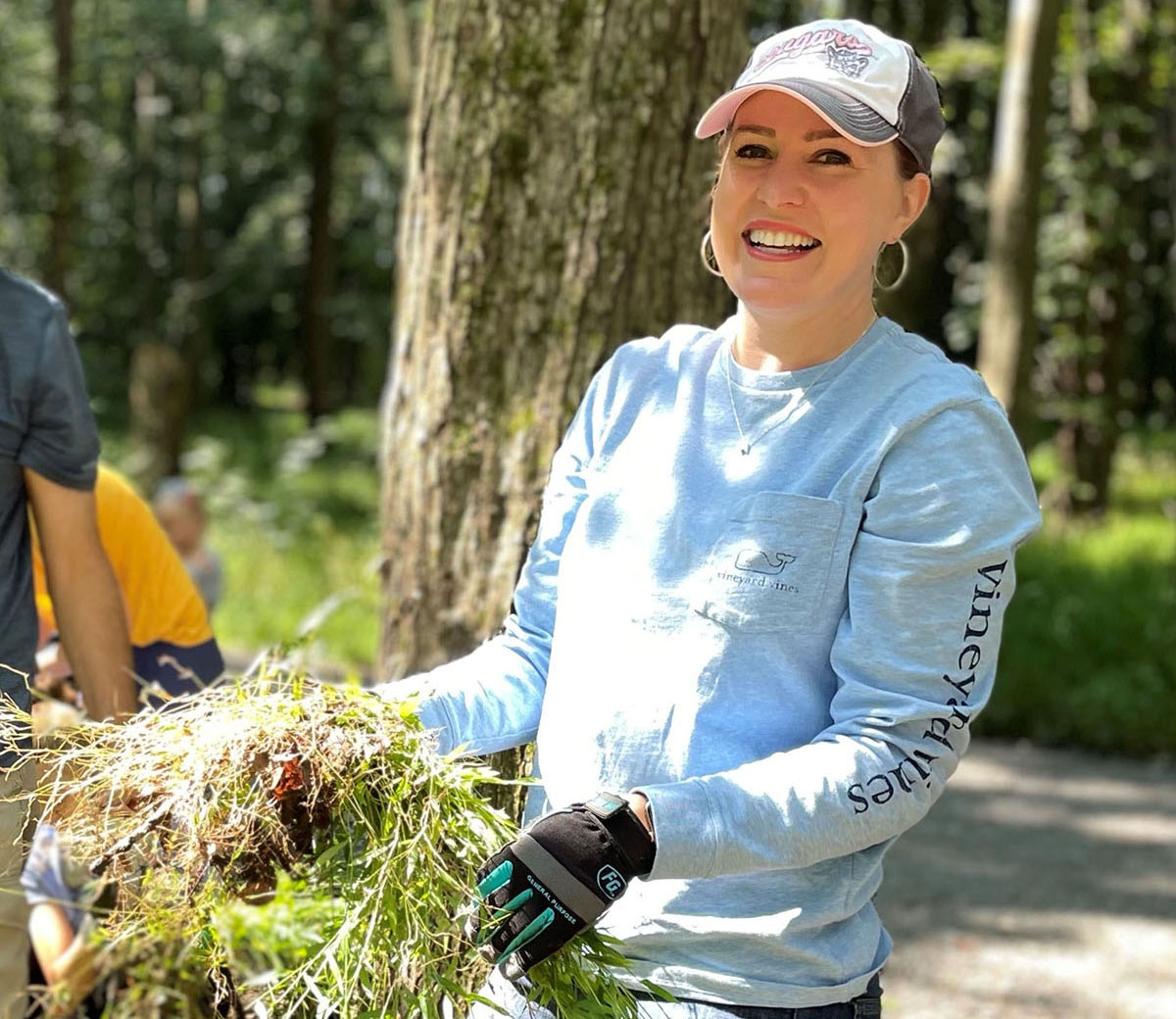
February is American Heart Month, a reminder to focus on keeping your heart healthy. Regular physical activity is a wonderful way to strengthen your heart, and giving back to your community can also contribute to overall health. Check out the volunteer opportunities below that support both, and if you’d like to explore others in Fairfax County, visit bit.ly/FFXVOLUNTEER.
Are you, or someone you know, passionate about cardio, Zumba, Tai Chi, S.A.I.L., or Line Dancing? Fairfax County Senior Centers are looking for volunteer instructors. Go to bit.ly/SeniorCtrOpps for the full list of opportunities. Questions? Email VolunteerSolutions@FairfaxCounty.gov or call 703-324-5406.
Fairfax County Park Authority’s (FCPA) Adapted Aquatics program needs volunteers to provide encouragement and assistance to children and adults with developmental and/or intellectual disabilities. Depending on location, certified instructors coach everything from basic swimming and water safety skills to Special Olympics swim team practice in indoor pools. Volunteer assistants must have basic swimming skills and commit a few hours per week. Sessions last six to 10 weeks, with classes typically offered on weekends at Fairfax County recreation centers. Apply online at bit.ly/FCPAqua or contact Linda Crone at Linda.Crone2@FairfaxCounty.gov to learn more.
While we look forward to spring, consider planning ahead by signing up for outdoor volunteer activities. Adults who enjoy staying active can find several volunteer opportunities within the Fairfax County Park Authority. Many roles involve outdoor activity and flexible schedules, including invasive plant removal and habitat restoration, where volunteers remove non-native plants, rescue native trees, and restore natural areas through walking, bending, and light lifting.
Other opportunities include trail and park maintenance projects such as cleanup days and seasonal grounds work that help keep parks safe and welcoming. Park Volunteer Teams provide hands-on support at individual parks, allowing participants to choose activities that match their interests and physical comfort level. These roles encourage regular movement, time outdoors, and community connection. Additional opportunities include assisting with park programs and community events. To explore the variety of available indoor and outdoor roles with FCPA, visit bit.ly/FCPAVol.
If you wish to submit volunteer opportunities to be highlighted in a future column, contact Tanya Erway at Tanya.Erway@FairfaxCounty.gov.
(by Katie Patterson, Long-Term Care Ombudsman)
Human nature includes a need to engage in meaningful activities that are enjoyable and provide a sense of belonging. Therefore, long-term care (LTC) facilities are required to implement ongoing resident-centered activities programs, including facility-initiated, individual, and independent activities. Activity programs within LTC facilities must be run by a qualified therapeutic recreation specialist or an activity professional. All activities should incorporate residents’ interests, hobbies, and cultural preferences. Activities are integral to maintaining and improving a resident’s physical, mental, and psychosocial well-being and independence.
As a mandated program under the Older Americans Act, the Northern Virginia Long-Term Care Ombudsman Program (NVLTCOP) is often called on to assist residents and consumers to advocate for their rights to ensure quality of care and quality of life. For more information about activity programs, or other nursing facility and assisted living concerns, please call the NVLTCOP at 703-324-5861, TTY 711, or email NVLTCOP@fairfaxcounty.gov.
Caring for a loved one is not easy. Many caregivers aren’t sure where to turn for encouragement and advice as they care for their loved ones, not to mention how to manage their own mental health and well-being. Delma Thompson and Deme Warner, both Social Work Case Managers with Inova ElderLink, talk about resources this program offers to older adults and family caregivers. Local resident Susan Smith shares her experience with ElderLink’s A Matter of Balance program and how it benefitted her.
Mature Living can be seen on Channel 16 or 1016 (depending on your service provider) on the following days and times:
Mature Living replays on Channel 16 may be preempted by Board of Supervisors, Board of Zoning Appeals, or Planning Commission meetings. Mature Living can also be seen on-demand any time – visit: FairfaxCounty.gov/cableconsumer/channel-16/mature-living.
You can find information on services for older adults at FairfaxCounty.gov/OlderAdults or call 703-324-7948, TTY 711, Monday-Friday.
(by Jennifer Tchida, Access Services, Fairfax County Public Library)

As we age, issues may crop up that prevent a lifelong reader from enjoying a book. Vision problems such as cataracts, glaucoma and macular degeneration start to appear. Or a physical disability such as stroke, accident or neuromuscular disorder may occur. While any of these conditions may prevent you from reading a standard book, Fairfax County Public Library has a solution.
FCPL’s Access Services Library works with the National Library Service for the Blind and Print Disabled, Library of Congress (NLS), to provide access to digital books, magazines and braille materials to customers through the Talking Books program. The digital books play on a stand-alone machine that is easy to use, especially for those who may be less confident with technology. All materials and machines are borrowed and returned by mail at no cost to the customer.
If you have a smart mobile device with Wi-Fi capability or a data plan, you can also use NLS’ BARD Mobile. This app provides customers with instant access to more than 170,000 digital books and over 90 magazines. Digital materials are available in more than 44 languages, including Spanish, Chinese and Arabic. Check out the newest David Baldacci, John Grisham or Dan Brown novel, or see what’s popular in the world of nonfiction. Each day new digital audio books are added to the collection. And the best part? No waiting lists! Books are always available for your reading pleasure.
To enroll in Talking Books, Access Services Library requires an application with a signature from a certifying authority. You can apply online or find the application at bit.ly/ASfcpl. If you have questions, please call Access Services at 703-324-8380 or email libas@fairfaxcounty.gov. We look forward to helping people continue their reading journey!
(by Linda Hernandez-Giblin, Fairfax Area Agency on Aging)
The Fairfax Area Commission on Aging (COA) is an advisory board mandated by the Older Americans Act. Commissioners for the Fairfax Area Commission on Aging are appointed by the Fairfax County Board of Supervisors and the City Councils of the City of Fairfax and the City of Falls Church.
At the January 21 COA meeting, the COA continued discussion on the implementation of the SHAPE the Future of Aging Plan and Initiative Development Committees. SHAPE Initiative Development Committee meetings will be ongoing through the duration of the Plan. In addition, Lauren Elcesser, Director of the ElderLink program, shared program updates, insights into how they are working in the community and how the work connects to the SHAPE Plan. ElderLink is a nonprofit partnership between Inova and the Fairfax Area Agency on Aging. At the February 18 meeting, the COA will continue to work on the SHAPE the Future of Aging Plan.
COA Meeting - Wednesday, Feb. 18, 1 p.m.
In Person: Pennino Building, 12011 Government Center Pkwy, Fairfax, VA 22035 – Room 505
To obtain meeting materials, visit FairfaxCounty.gov/familyservices/older-adults/fairfax-area-commission-on-aging/meetings or contact Linda.Hernandez-Giblin@FairfaxCounty.gov or call 703-324-5859. For ADA accommodations, contact Linda.Hernandez-Giblin@FairfaxCounty.gov or call 703-324-5859, TTY 711.
(by Gwen Jones, Department of Family Services)

Older Americans have worked hard to save money for retirement. In the U.S., adults aged 50 and older make up about 32% of the population. However, they hold over 67% of the money stored in banks, according to AARP. Unfortunately, this makes them targets for financial scams and exploitation.
Financial exploitation is a growing problem for older adults. Banks and other organizations lose about $1 billion each year because of these scams, but the real loss is likely much higher because most cases aren’t reported. While police and other groups are trying to teach older adults how to protect themselves, more needs to be done to prevent these crimes.
What Is AARP’s BankSafe Initiative?
In 2018, AARP teamed up with financial institutions to fight financial exploitation of older adults. They created training for bank staff to help them spot and stop scams or fraud. To test this training, they worked with 100 banks and credit unions over six months. During this time, the program reached three million customers.
The program, called BankSafe, is now free for all banks, credit unions and financial advisory firms to use across the U.S. Thousands of workers have taken the training online to learn how to recognize and prevent financial exploitation. A study in 2022 by Virginia Tech found that BankSafe-trained employees saved customers 16 times more money than workers who didn’t complete the training. So far, BankSafe has helped save more than $400 million.
The BankSafe Trained Seal
To help consumers identify banks, credit unions and financial advisory firms that have trained their staff to prevent financial exploitation, AARP awards organizations with the BankSafe Trained Seal. To earn this seal, organizations must ensure that at least 80% of their frontline staff completes AARP's comprehensive BankSafe training annually, as well as actively pursuing policies to address suspected financial exploitation. Organizations must also have a positive standing in Better Business Bureau ratings and follow specific legal and regulatory standards.
In 2025, 193 banks, credit unions and financial advisory firms nationwide earned the 2025 BankSafe Trained Seal, a 15% increase from 2024. For the full list of 2025 AARP BankSafe Verified Organizations, visit bit.ly/45vftj2.
The BankSafe Trained Seal is not an endorsement – it just shows that the organization’s staff is well-trained to help prevent financial exploitation and protect customers. Since this training is free and available online, any financial institution can take part and earn the seal.
BankSafe Dementia Hub
In June 2025, AARP launched the BankSafe Dementia Hub to help banks protect people who have dementia or other memory issues. People living with dementia are at an even higher risk of being exploited, so this free, online hub gives financial institutions tools to better serve and protect them. The hub includes videos, guides, templates, and resources to teach staff how to:
To learn more, visit the AARP BankSafe Dementia Hub at aarp.org/lp/banksafe-dementia-hub.
To submit an event, email DFSGoldenGazette@FairfaxCounty.gov. All events must be received by the first day of the month prior to the issue month.
Curiosity Never Retires
Looking for a way to keep your mind active, make new friends and find new adventures? Osher Lifelong Learning Institute at George Mason University (OLLI Mason) offers over 500 onsite and online courses every year, everything from literature and history to health and investing, as well as regional outings, social events, and over 20 different clubs. Take as many classes as you want for one yearly fee. No homework, tests or papers, just the chance to rediscover what you love. For more information or to request a current course catalog, go to olli.gmu.edu or contact the OLLI Mason office at 703-503-3384.
Love to Play Softball? Join Us!
The Golden Girls of Northern Virginia, a senior women’s softball league, is looking for players. Any woman over the age of 40 is encouraged to join. All skill levels are welcome. We play most Wednesday evenings and Saturday mornings in Vienna from May-July and September-October. For more information, please visit our web site goldengirls.org.
Socrates Café
Tuesday, Feb. 3, 1:30-2:30 p.m.
Tysons Pimmit Regional Library, 7584 Leesburg Pike, Falls Church
A Socrates Cafe is a gathering where people from different backgrounds get together and exchange philosophical perspectives based on their experiences, using the cooperative dialogue of the Socratic Method. For more information and to register, visit librarycalendar.fairfaxcounty.gov/event/15568711.
Lifetime Learning Institute of Northern Virginia Virtual Forum
Wednesday, Feb. 4, 9:30-11 a.m.
Join LLI/NOVA for this free program. The speaker will be Earnest W. Porta, Jr., the mayor of Occoquan, VA. He will talk about interesting historical episodes in the over 200 years history of the town. Register at llinova.org under Classes and Events tab. for more information, email admin@llinova.org.
Worm Composting Bin Workshop
Saturday, Feb. 7, 2-4 p.m.
Green Acres Center, 4401 Sideburn Rd., Fairfax
Learn about composting with worms and build your own DIY worm composting bin. Worm composting is an easy way to convert kitchen scraps into rich material to feeds houseplants and garden beds, while reducing the amount of trash going into the waste stream. The workshop costs $10 and spaces are limited. Learn more and sign up at bit.ly/4jtd6Dn.
Communications Strategies
Wednesday, Feb. 11, Lunch: Noon-12:30 p.m., Class: 12:30-1:30 p.m.
Insight Memory Care Center, 3955 Pender Dr, Suite 100, Fairfax
This class will help care partners understand the communication changes that may occur with dementia and learn new techniques to effectively respond and connect with a loved one. Register at InsightMCC.org/events.
Free JCA Northern Virginia Virtual 50+ Employment Expo
Thursday, Feb. 12, 10 a.m. - 2 p.m.
Age 50+ jobseekers – don't miss this online employment expo. Morning presentations, How to apply for a Fairfax County job and Rebranding for a Career Pivot will set you up for success. In the afternoon, area age-friendly employers will talk about their companies and openings and answer your questions. Register today at VirtualExpos.AccessJCA.org. For questions, email EmploymentExpos@AccessJCA.org or call 703-652-1518.
Brain Fitness Time
Friday, Feb. 13, 2-3 p.m.
George Mason Regional Library, 7001 Little River Turnpike, Annandale
Improve your brain health with fun exercises like sudoku, word puzzles, memorization games and more. No registration. For older adults. For more information, call 703-256-3800.
Fairfax Village in the City’s Friday Morning Speaker Series
Friday, Feb. 20, 9:30 a.m.
Stacey C. Sherwood Community Center, 3740 Blenheim Boulevard, Fairfax
Steve Gurney, publisher of the Positive Aging Sourcebook, will speak on the topic, "A New Perspective on Aging and Senior Living." For more information about this free event, call 703-385-5738 or email at village@fairfaxva.gov.
Positive Approach to Care - Normal vs. Not Normal Aging
Tuesday, Feb. 24, 11 a.m.-1 p.m.
RAFT provides innovative geriatric mental health services to keep older adults in their communities. Join RAFT for this interactive webinar, designed for care professionals and family caregivers. We will discuss the differences in sensory input between normal aging and not normal aging. Attendees will learn techniques to approach and support individuals with dementia. Register online at Microsoft Virtual Events Powered by Teams. Learn more about RAFT at raftnorthernvirginia.org.
Stop the Bleed
Wednesday, Feb. 25, 7-8:30 p.m.
Reston District Police Station,1801 Cameron Glen Drive, Reston
Learn the lifesaving skills needed to prevent the number one cause of death after an injury: bleeding. A formal presentation will be followed by hands-on practice of applying direct pressure, packing a wound, and using a tourniquet to stop bleeding. You will receive a certificate of course completion. Sign up at bit.ly/4bdBKFL
Meet Me: National Museum of the United States Army
Thursday, Feb. 26, 11 a.m.-1 p.m.
1775 Liberty Drive, Fort Belvoir
Visit the National Museum of the United States Army for an immersive history experience, including a lecture with multimedia and artifacts to offer a deeper dive into a specific Army topic, encouraging discussion and connection with the people and events that shaped our nation’s military history. Insight Memory Care Center's Meet Me Outings are designed for those with mild cognitive impairment or in the early stages of dementia and a family member/friend. Register at InsightMCC.org/events.
Dates, prices, and times are correct at publishing. However, please confirm information using the phone numbers or websites provided.
Check out the past newsletters.

*Fairfax County is committed to nondiscrimination on the basis of disability in all county programs, services and activities. To request reasonable accommodations or to receive this information in an alternate format, call 703-324-7948 or TTY 711.
